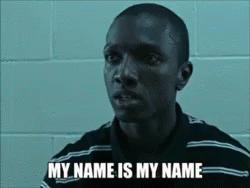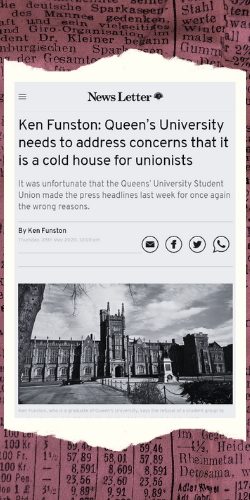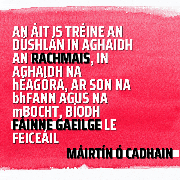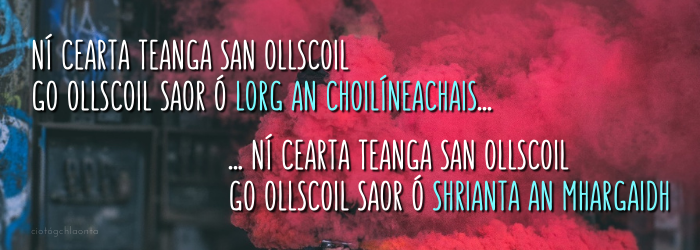An litir dhearg
Bí ar an eolas! Faigh ár nuachtlitir le bheith suas chun dáta leis na feachtais ar fad.

In the autumn of 2010 I sat in the QUB Students’ Union building, registering as a student for the first time, anxiously imagining that something would go wrong — “I’m sorry son, there’s been a mistake, maybe you can apply again next year?”
Relief. They could see me there on their computer, I’m in. I moved on to get my student card.
Now there was a hitch. “We have two names for you here.” Relief again, a familiar problem, I knew how to answer this one.
“On UCAS my school registered me as Mag Uidhir,” I explained, “and that’s what I go by. On my passport it’s Maguire. But it’s Mag Uidhir on my electoral ID card – here, see?” The conversation went something like that, me with my big naive head on me.
The person in front of me — a student, working for a few quid — frowned. This was above their pay grade. She fetched a manager of some kind and the frowns multiplied. “It’ll have to be Maguire on your card.”
“But it’s Mag Uidhir on my electoral ID, here…”
Silence.
“Oh yea no worries,” I said meekly.
Soon enough I strolled out, the glossy new card tucked away in my wallet. The photograph was dominated by the green of the Machaire Rabhartaigh hoodie I had on me that day.
I had grown up immersed in Irish, at home and at school. So for most of my first eighteen years, and certainly from I was about 15 onwards, I was a proud Gaeilgeoir. Despite not having had much contact with any of society’s ‘big institutions’, I had anticipated that Queen’s would be a step into a bit of a different world, one where Irish was more at the margins compared to heady days at Coláiste Feirste.
But I didn’t expect my first interaction with them as an Irish speaker to be so blatant. Your name is what we say it is. It may seem stupid, but that first encounter had an affect on me.
Because during the four years I spent at Queen’s, I was still a Gaeilgeoir, but not in the same way – not confidently. I wasn’t so much ashamed of it as apologetic: “Aye, Somhairle, yea Somhairle. So-whirl-yeh. Yea, it’s a bit of a tongue-twister! Ha ha…”
At first-year induction, I mentioned to my assigned supervisor that I was concerned about technical terminology. “I did all my school maths through Irish, I’m kind of worried I might struggle to understand some of the terms in English.” This was brushed off, and I felt a bit daft.

I was right to be concerned, however. “What is an isosceles triangle?” I asked a friend in one of our first lectures (‘Let BCA be an isosceles triangle’). His eyes said: here you are doing a maths degree, how can you not know what this basic geometrical shape is?
Something held me back from replying that I knew plenty about triantáin, from triantáin dhronuilleacha and triantáin chomhshleasacha, to this triantán comhchosach in question. In the end, I didn’t ask any more of these questions, during what turned out to be a difficult first semester.
There were many more such interactions over the course of my time at Queen’s – with supervisors, admin staff, receptionists at Elms, etc. These particular people weren’t being bigoted. They were often overworked and underpaid, and when it came to Irish, they just didn’t get it. There was no culture from the top which would have caused them to think otherwise. I was a bureaucratic inconvenience.
But there were exceptions, times where I was briefly reminded that my being a Gaeilgeoir was valuable to Queen’s, whether they recognised it or not.
Early afternoon and sunny. Tennents, two-pound-a-pint. One of those midweek days which are all the same and me and a cara are sitting in the SU feeling superior for having actually gone to class before going on it.
The Queen’s timetable said we had a tutorial at 3. Our own, carefully curated, timetable disagreed. Cost-efficient drinking block-booked our calendar.
Until suddenly it didn’t.
I don’t know what came over us but at some point we thought it would be a great idea and really very funny to go to this tutorial half cut.
Looking back a few days later, it was nearly a massive waste of time. The notes I had taken made no sense, they were illegible. The beer had bypassed my brain and gone straight to my fingers, my steaming hand apparently writing as if for the very first time.
And yet, showing up was a great call, a stroke of inspiration! Because the pints had dulled my imposter syndrome and removed my inhibition. And when I had had enough of not understanding the material, I took a deep breath, and raised my hand:
“Nancy, I can’t follow those steps on the board”.
I might have slurred this, I don’t remember.
Nancy was a PhD student from South East Asia who took some of our tutorials. She didn’t have enough time then to explain the problem, but she said to me and my friend that we could go to her the following day and she’d go through it all.
We went – by then, sober – and at some point we thanked her for taking the time to help us. She turned to me and said, “you know I’ve been taking these tutorials for three years now and that was the first time anyone called me by my first name”.
And there it was, like a ton of bricks, the effects of Pearse’s murder machine alive and well and pulsating in my eardrums because this timid but undoubtedly kind and capable woman was halfway across the world teaching heavy-duty mathematics in a foreign language to us waster students who hadn’t thought to stop for a second and call her by her first name. Cold, soulless, so utterly futile.
I learned soon enough that the vast majority of lecturers had no time for formalism; they were Ariels and Cathys and Brians, not Dr. this and Professor that. But PhDs are known to be isolating experiences, not to mention doing one in a strange land, and Nancy wouldn’t have had the same opportunity to broach this issue with us in the way our lecturers did. I only knew her name because it said it on a paper timetable that every one of us received.
When a student, admittedly powered as he was by watery lager, finally used it, it mattered to her.
I remember thinking, in Coláiste Feirste we called each other by our first names. That’s worth something. Our names are our names.

Mar a dúirt Marlo
In my time there, QUB didn’t seem to hate the Irish language. I experienced more of an institutionalised blindness to Irish, rather than open animosity. But that’s because in the years I was at Queen’s, Gaeilgeoirí didn’t poke the bear.
There was no Irish language movement on campus then, no real pressure applied, nothing to which the institution had to respond as an institution. (It’s also true that I was in the school of maths. People in the school of history, say, might have an alternate view…)
Today, however, students are justifiably giving this antiquated academy hell. And where I didn’t face direct discrimination, they have. They placed (entirely reasonable!) language demands on the university, forcing the latter to show its true colours. Most egregious was a statement from management which implied that a language spoken through the ages could be “provocative, offensive or intimidatory”.
The university apologised, of course. But can anyone really blame a member of the Irish language community at QUB for thinking the university sees their very existence as ‘provocative, offensive and intimidatory’ as a result?
Vestiges of the Orange State’s open disdain for the language have managed to cling on, until now dormant, within the crevices of Queens’ hallowed ‘red brick’. Irish language activists, with their refusal to stay silent, have roused them for all to see.
They were, and are still, full supporters of the marketisation of higher education, of which increased fees are a core part.
None of this is to say that Queen’s were all sweetness and light during my stint. 2010 saw Nick Clegg rip up his promised opposition to tuition fee rises upon entering into government with the Tories. Students across the north mobilised on a mass scale, with marches, occupations, and a sit-down protest in Belfast City Centre which ground traffic to halt for hours and led to several arrests.
We won a partial but important victory: northern undergraduate fees would remain capped and wouldn’t rise to £9,000. Queen’s didn’t back us in this endeavour, to put it mildly. They were, and are still, full supporters of the marketisation of higher education, of which increased fees are a core part.
Management may not have written a disgraceful letter calling students provocative, but their daily efforts at marketisation caused, and continues to cause, fundamental damage. It hurts students and workers alike, Gaeilgeoirí or not. Just ask the UCU strikers.
Among countless ills, it generates: overworked staff; the devaluation of education for education’s sake; prioritisation of skills necessary for capitalist profit-making over human development; and massive student debt.
The greatest single source of income for QUB is student fees, a trend similar to most universities in the UK. This simple fact is at the heart of the marketisation of higher education, because funding responsibility has been shifted away from the public purse and onto the individual in the form of private debt. This has seen a proliferation of postgraduate courses being offered as well as a trebling of international students, as the fee cap is much higher in both those cases.
In recent years, pressure has been applied to Queen’s by sections within Unionism over a supposed lack of unionist representation in university life. This is faux-outrage, stoked by certain individuals and forces who are currently in deep crisis.

However, QUB can’t afford to allow this accusation to become the dominant perception. University managers are no doubt already acutely aware of the fact that young people from unionist backgrounds are more likely to go across the water to receive a third-level education than their counterparts from nationalist backgrounds.
The top echelons don’t need to be particularly bigoted towards Irish (they may well still be!) to recognise that increased Irish language visibility will be pounced upon by the Nelson McCauslands of this world to further mischaracterise the university as a “cold house” for unionists, thereby risking sacred student enrollments.
The top echelons don’t need to be particularly bigoted towards Irish (they may well still be) to recognise that an accommodation scheme for Irish speakers will cause problems for the latest prong of marketisation: extortionate student accommodation developments. Last year saw many students unable to find a term-time residence – guaranteed rooms for Gaeilgeoirí could frighten even the most non-sectarian free-marketeer in the administration.
The top echelons don’t need to be particularly bigoted towards Irish (they may well still be) to recognise that reinvigorating the university’s teaching of the language goes against the logic of the market, where humanities are a ‘luxury’ and ‘the future is STEM’.
And the top echelons don’t need to be particularly bigoted towards Irish (they may well still be) to recognise that uppity Gaeilgeoirí can build on demands, and victories can sometimes spur more demands. In an environment where every resource has to be mobilised towards the institution’s economic growth, catering to the developing needs of Gaeilgeoirí risks setting a ‘commercially wasteful’ precedent.
Despite whatever platitudes we might hear in the future, the neoliberal university will never be a perfect friend to the Irish language. Even were Queens’ history not deeply entwined with empire, the language would be up against it.
But, of course, that is its history. And therefore, alongside marketisation, it forms an ugly part of its present, too. A potent mix.
Recently, at the launch of an excellent vision for Irish at Queen’s put together by a group of students and staff, one current student spoke powerfully of the alienating experience felt by young, working class Gaeilgeoirí as this intimidating institution continually denigrates their chosen language.
In response, this group has put together a plan for improving the standing of the language within the current university set-up. Among other things, it would involve bilingual signage, greater options for Irish language study, language-centred accommodation schemes, and an improved culture of acceptance and understanding in recognition of the decades of marginalisation.
The Irish language should be a living part of Queen’s because Irish speakers are a living part of northern society. That is all the justification that will ever be needed.
Such steps would have meant something immeasurable to me had they been in place when I first enrolled a decade ago. The proposals are a real testament to the hard work and commitment of activists at Queen’s over recent years. Certainly, it will take substantial campaigning to achieve even one of them, nevermind the whole lot, but that process will illuminate the long shadow cast by the institution’s colonial past.
In that struggle, activists at Queen’s will come under pressure to show how Irish is amenable to the neoliberal university and its desire to churn out young people ready made for boosting the profits of the super-rich. ‘Queen’s will be ‘missing a trick’ by not making the most of all the advantages of the Irish language!’ ‘Gaeilgeoirí are just as able to work in Citibank or First Derivatives!’
Gaeilgeoirí are as capable as anyone else in today’s workforce. And QUB is certainly asleep at the wheel when it comes to the potential benefits of mainstreaming Irish within its halls. Both these statements are entirely true, and they should be repeated. But take these arguments too far – if you focus on them and them alone – there’s a risk that your efforts will eventually consist of trying to prove how Irish is compatible with the marketisation of higher education.
The Irish language should be a living part of Queen’s because Irish speakers are a living part of northern society. That is all the justification that will ever be needed.
Looking in from the outside, there are two potential routes for today’s Irish language movement at Queen’s. In both scenarios, the movement fights with energy and conviction for the remarkable program outlined at the launch event.
And given their recent record, campaigners could well win concessions from Queen’s, achieving their goals, forcing the university to engage in elements of ‘decolonisation’, and doing the Gaeilgeoirí of the future a gargantuan service.
But it is also possible that the university finds a way to accommodate these language demands while leaving the underlying structure largely intact. In fact, the administration might do precisely that, to release the pressure valve, to save themselves from having to enact more fundamental reforms.
This is a challenge for all marginalised groups: representation is important, but so are under-the-surface changes. To a large extent, university managers across the world have succeeded in blunting radical calls for diversity. They have updated their branding to appear more representative, to better serve and attract students from different backgrounds, appropriating surface-level progress into the heart of their marketing strategies. All the while, gender and racial pay gaps live on, and students from more disadvantaged circumstances are loaded with suffocating amounts of debt.
A letter to the Irish-speaking graduates of the future which states the debt they owe to be £28,387, this letter will be no less alienating for Gaelgeoirí from working class backgrounds if it’s written in Irish.
However, one of the routes open to gluaiseacht na Gaeilge at QUB continues to connect these dots. In this scenario, the movement fights for Irish language rights, with all the expertise and gusto and leadership that went into that recent launch event, while simultaneously taking up the struggle over the future of higher education.
In 2019, An Cumann Gaelach was at the forefront of supporting lecturers striking for better pay and conditions. Over the coming period, lecturers will again be on strike, joined by many of the myriad casualised staff which keep neoliberal universities running. And their demands this time are even more so directed at marketisation.

Can pobal na Gaeilge in general deepen its links with this struggle, and with those of the other big questions on campuses, such as the climate emergency, housing, bodily autonomy, etc.? Can language rights be conceptualised and fought for, not as a separate thing that stands alone, but as part of a wider movement for the future of the university?
There is no reason to think why not. At that launch event, the messages of support for the striking staff were many and strong. Indeed, it’s largely due to how this current crop of students have voiced their demands that we’re discussing this complex relationship between language and class. An Dream Dearg has been saying for some time that students are leading the charge; this is true in more ways than one.
But as I mentioned above, such radicalism will come under pressure – it always does.
It will come under pressure, from both the university and from sections of the Irish language community itself – pressure to cash-in its momentum at the earliest stage. For the sake of tweaking the status-quo to allow room for Gaeilgeoirí, but leaving the overall structure largely in place. Creating a pathway for the more fortunate, select students, while those from working class backgrounds juggle jobs to pay their way through increasingly more expensive yet devalued degrees.
None of this is to say that Irish language rights should only be fought for if it’s done as part of a perfectly socialist campaign, crafted and fine-tuned by James Connolly himself. Far from it! Taken alone, the outline developed by campaigners for reforming Irish at Queen’s will constitute massive progress, and should be fully supported on its own terms.
It is to point out, however, that the more our universities are replaced by overpriced, educational equivalents of factory farms, the more hollow those rights will be.
One day in my third year I had to call in to an admin office on campus, trying to sort some long-running issue. Following a hefty enough back-and-forth and lots of puzzled expressions, one of the workers behind the desk finally exclaimed “Aha!”
“Your name!”
Here we go again. “…Yea?”
“It’s different on your email to what it is on your student card, isn’t it?”
Because of the convoluted process of my registration, my Irish name had sneaked through in one place: the email address. I soon learned this anomaly had been causing the women in the office headaches for years.
Initially, I took some pleasure in the fact that QUB’s insistence on Maguire had resulted in administrative trouble. Filleann an feall, etc. In reality, however, it wasn’t the big whigs, but the ordinary staff, who were inconvenienced. And those women were clear about who to blame, and it wasn’t me: “But sure, that’s your name.”
When it comes to higher education, Gaeilgeoirí, lecturers, admin staff, students, temporary workers, marginalised groups – we all have the same enemy. It’s the boards and chancellors which are successfully turning sites of knowledge and inquiry into profit-making machines. Who hope to squeeze as much labour as possible from every employee, regardless of their mental health. Who invest their vast surpluses in arms manufacturing and environmental destruction. Who treat students as cash cows, holistic learning as wasteful, economic growth as god.
Boards and chancellors who will only bend to the needs of the Irish language for as long as it leaves the holy grail of marketisation essentially untouched.
Gaeilgeoirí have a massive fight on their hands to rid Queen’s of the legacy of colonialism and discrimination that currently plagues the Irish language on campus. That battle can’t fully be won without also rooting out the capitalist rot that today holds higher education in a death-grip. To this end, supporting UCU’s upcoming industrial action is critical, and making third level education publicly funded, free at the point of delivery: fundamental.
Bilingual signs advertising the closing of humanities departments is not progress. Bilingual signs advertising the abolishment of student fees…? That’s something to put your name to.

Bí ar an eolas! Faigh ár nuachtlitir le bheith suas chun dáta leis na feachtais ar fad.